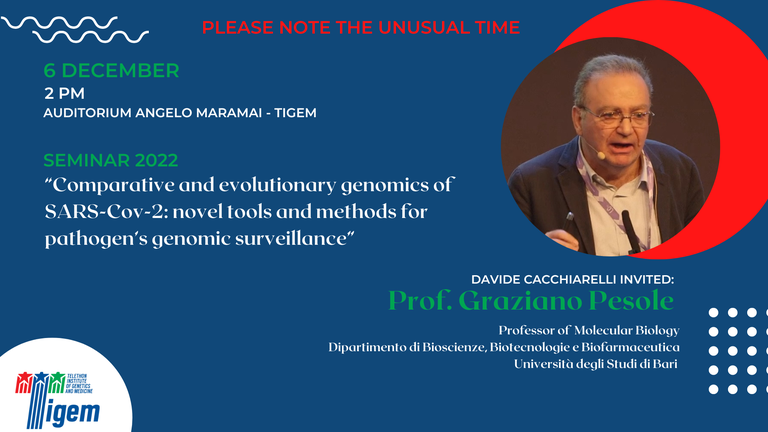Prof. Graziano Pesole - "Comparative and evolutionary genomics of SARS-Cov-2: novel tools and methods for pathogen’s genomic surveillance"
- When Dec 06, 2022 from 02:00 PM to 03:00 PM (Europe/Berlin / UTC100)
- Where Tigem Auditorium Angelo Maramai
- Contact Name Davide Cacchiarelli
- Contact Phone 08119230659
-
Add event to calendar
iCal

- https://www.tigem.it/newsroom/seminars/prof-graziano-pesole-comparative-and-evolutionary-genomics-of-sars-cov-2-novel-tools-and-methods-for-pathogen2019s-genomic-surveillance
- Prof. Graziano Pesole - "Comparative and evolutionary genomics of SARS-Cov-2: novel tools and methods for pathogen’s genomic surveillance"
- 2022-12-06T14:00:00+01:00
- 2022-12-06T15:00:00+01:00
Professor of Molecular Biology
Dipartimento di Bioscienze, Biotecnologie e Biofarmaceutica
Universita' degli Studi di Bari
Abstract
Accurate and timely monitoring of genomic diversity is crucial for limiting the spread of potentially more transmissible/virulent strains of SARS-CoV-2. Currently, over 14 M distinct viral genome sequences have been made publicly available, and a sophisticated nomenclature system based on phylogenetic evidence and expert manual curation has allowed the identification of emerging lineages of potential concern.
By performing extensive comparative analyses, we identified genomic features and epidemiological dynamics, characteristic of viral variants of epidemiological relevance and derived an effective scoring system for the prioritization of SARS-CoV-2 variants. The evidences have been implemented in HaploCoV, a novel software for the exploration of genetic diversity in time and across different geographic regions, and the prioritization of emerging variants of SARS-CoV-2. HaploCoV can be integrated with any extant classification/nomenclature systems, demonstrates high levels of accuracy and reproducibility and identifies the large majority of epidemiologically relevant viral variants - as flagged by international health authorities - with rapid turnaround times.
Our results highlight the importance of the application of strategies based on the systematic analysis and integration of regional data for rapid identification of novel, emerging variants of SARS-CoV-2 thus contributing to relevant advances to current genomic surveillance methods
